1Pe 3:15 But sanctify the Lord God in your hearts: and be ready always to give an answer to every man that asketh you a reason of the hope that is in you with meekness and fear:
In the comment thread on one of my marriage posts my friend
wrote:Von,
While I am in NO WAY putting down the serious and formal nature of marriage, I do think there is a reasonable burden of proof that has been unexplored by most of the commentators. I say this, as you know, as one who made and participated in a formal marriage covenant, and I certainly believe that if you make such a covenant, you are obligated to it.
A quick word search examination of the word “covenant” using an app offers numerous examples of God discussing His covenants with His people, such as the Noahic, Abrahamic, and Davidic covenants. While the vast majority of references to covenant refer to God's covenants with man, the same word search uncovers passages such as the (not exhaustive) list below which mention covenants between men, and between kings and their subjects:
Gen. 21, Gen. 26, Gen. 31, Ex. 23, Ex. 34, Duet. 7, Josh. 24:25, 1 Sam. 11:1, 1 Sam. 18:3, 1 Sam. 20, 1 Sam. 23, 1 Kings 20:34, 2 Kings 11:17...
It is safe to say that there is no shortage of the use of the word covenant, or of examples of covenants even between individuals such as Jacob and Laban, David and Jonathan, or, as Samuel Rutherford pointed out in Lex Rex, of kings covenanting with the people who would be his subjects.
That frequent and obvious familiarity with covenant makes it curious that we get all the way to the last time frame of the Old Testament before there is a reference that can be directly interpreted that marriage in general is a covenant. As far as I can tell, there are three references that infer that marriage is a covenant.
Those three passages are Malachi 2:14, Ezekiel 16:8, and possibly Proverbs 2:17.
That said, exegetically, I'm not sure that that actually means that all marriages are covenants any more than some households being baptized means that all infants should be baptized...
Ryan
Is marriage a covenant? In what way is marriage a covenant? What is a covenant? Are there more than one type of covenant? Reading between the lines these are some of the questions that I tease out of Ryan’s post. Or note or whatever.
I am inserting this into my letter exchange with Andrew (see links below), but giving it a funny title to make it clear it isn’t in the main line. As before, anyone is free to jump in
.
Is Marriage a covenant?
The English Word
The English word ‘covenant’ is used in 272 verses in the KJV, and occurs 292 total times in those verses. (Total, not each.)
COVENANT, noun [L, to come; a coming together; a meeting or agreement of minds.]
1. A mutual consent or agreement of two or more persons, to do or to forbear some act or thing; a contract; stipulation. A covenant is created by deed in writing, sealed and executed; or it may be implied in the contract.
2. A writing containing the terms of agreement or contract between parties; or the clause of agreement in a deed containing the covenant
3. In theology, the covenant of works, is that implied in the commands, prohibitions, and promises of God; the promise of God to man, that mans perfect obedience should entitle him to happiness. This do, and live; that do, and die.
The covenant of redemption, is the mutual agreement between the Father and Son, respecting the redemption of sinners by Christ.
The covenant of grace, is that by which God engages to bestow salvation on man, upon the condition that man shall believe in Christ and yield obedience to the terms of the gospel.
4. In church affairs, a solemn agreement between the members of a church, that they will walk together according to the precepts of the gospel, in brotherly affection.
COVENANT, verb intransitive To enter into a formal agreement; to stipulate; to bind ones self by contract. A covenants with B to convey to him a certain estate. When the terms are expressed ti has for before the thing or price.
They covenanted with him for thirty pieces of silver. Matthew 26:15.
COVENANT, verb transitive To grant or promise by covenant
Websters 1828
Hebrew Word
The English word ‘covenant’ is translated from the Hebrew word:
בְּרִית
berı̂yth
ber-eeth'
From H1262 (in the sense of cutting (like H1254)); a compact (because made by passing between pieces of flesh): - confederacy, [con-]feder[-ate], covenant, league.
Total KJV occurrences: 284
Now the first thing to notice is that in Malichi 2 we see that God uses that word to refer to marriage. So at least in the broadest sense, yes, marriage is a covenant.
But given that the word occurs 284 times in the Old Testament, it would seem obvious that not all uses of the word ‘covenant’ are created equal.
Man’s Covenant
Gal 3:15 Brethren, I speak after the manner of men; Though it be but a man's covenant, yet if it be confirmed, no man disannulleth, or addeth thereto.
G1242 (Strong)
διαθήκη
diathēkē
dee-ath-ay'-kay
From G1303; properly a disposition, that is, (specifically) a contract (especially a devisory will): - covenant, testament.
The New Testament obviously doesn’t use the Hebrew word to refer to covenant, but it, too, makes it clear that there are covenants between men, and covenants that include God. (Leaving aside the question of how God feels about men breaking covenants between themselves and how that affects our discussion.)
Which means that we need to ask ourselves “Is marriage a covenant between men?” I think the obvious answer to that is ‘no’. But I’ll admit it isn’t a popular answer. Let’s look at the evidence.
God Joins Them
Mat 19:6 Wherefore they are no more twain, but one flesh. What therefore God hath joined together, let not man put asunder.
Here Jesus states that in every marriage, it is God Himself who put the couple together. (This would obviously only apply to legitimate marriages.) If it is God who joins the couple, how can their marriage be a covenant purely created by them?
God Sets the Rules
1Co 7:4-5 The wife hath not power of her own body, but the husband: and likewise also the husband hath not power of his own body, but the wife.
Defraud ye not one the other, except it be with consent for a time, that ye may give yourselves to fasting and prayer; and come together again, that Satan tempt you not for your incontinency.
Here Paul, without any reference to any particular words or vows said by any particular couple, states that married persons have certain obligations toward each other.
No one pays attention to marriage vows
Let’s look at this from the other direction for a minute. If marriage is merely a human contract, then we would need to look at the terms of that contract… the vows they made… to determine what was being done or being violated. But no one does that. And, especially, Scripture never does that.
What Scripture (and the rest of us) does (do) is to treat marriage as if it was a unitary thing that everyone who was married has joined in on, and we merely mount the marriage vows on the wall. That is very, very different from the way we treat contracts.
.
Getting serious about covenant
Now, let’s look at the definition of covenant, not some ordinary covenant between men, but the kind that we read about in Scripture. What do we see?
Gen 15:9-18 And he said unto him, Take me an heifer of three years old, and a she goat of three years old, and a ram of three years old, and a turtledove, and a young pigeon.
And he took unto him all these, and divided them in the midst, and laid each piece one against another: but the birds divided he not.
And when the fowls came down upon the carcases, Abram drove them away….
And it came to pass, that, when the sun went down, and it was dark, behold a smoking furnace, and a burning lamp that passed between those pieces.
In the same day the LORD made a covenant with Abram, saying, Unto thy seed have I given this land, from the river of Egypt unto the great river, the river Euphrates:
1) It often involves blood or other sacrifices. Not always, but in a significant number of times. And some of the big ones.
The one that comes to mind instantly is the covenant that God commanded with Abraham. Not the first covenant in Scripture, and not the only covenant with Abraham, but the fascinating one in Genesis 15. The one where Abraham cut a bunch of animals in pieces and God passed a lamp between them.
Marriage falls into this category. I’ll keep this PG rated and won’t go into the medical details, but marriage (marriage with a virgin woman) typically involves the rending of flesh, and blood, and passing between the rent flesh. Sorry for the graphic image… have I told you about circumcision?
Gen 17:8-14 And I will give unto thee, and to thy seed after thee, the land wherein thou art a stranger, all the land of Canaan, for an everlasting possession; and I will be their God. And God said unto Abraham, Thou shalt keep my covenant therefore, thou, and thy seed after thee in their generations.
This is my covenant, which ye shall keep, between me and you and thy seed after thee; Every man child among you shall be circumcised. And ye shall circumcise the flesh of your foreskin; and it shall be a token of the covenant betwixt me and you. And he that is eight days old shall be circumcised among you, every man child in your generations, he that is born in the house, or bought with money of any stranger, which is not of thy seed. He that is born in thy house, and he that is bought with thy money, must needs be circumcised: and my covenant shall be in your flesh for an everlasting covenant.
And the uncircumcised man child whose flesh of his foreskin is not circumcised, that soul shall be cut off from his people; he hath broken my covenant.
2) It involves mutual obligations
That is kind of the whole point of a covenant. One or more of the people involved is promising to do something, and usually it is two people. Or, perhaps, one person has done something and the other promises to do something in reaction.
Marriage obviously falls into that category. Several times in Scripture God speaks of the obligations of marriage, and even more often He implies them.
Deu 7:9 Know therefore that the LORD thy God, he is God, the faithful God, which keepeth covenant and mercy with them that love him and keep his commandments to a thousand generations;
3) It often, indeed usually, involves parties that are radically different in ability and resulting obligations. Abraham was commanded to circumcise himself and his male children (his male slaves and their male children) and pass that command down. God promised to make of Abraham a great nation. Not exactly an even exchange.
Marriage is obviously like that. You have God, who gives blessings of fertility, man, who has his role and his strengths, and woman, who has her role and her strengths. They are by no means equal.
Heb 10:29 Of how much sorer punishment, suppose ye, shall he be thought worthy, who hath trodden under foot the Son of God, and hath counted the blood of the covenant, wherewith he was sanctified, an unholy thing, and hath done despite unto the Spirit of grace?
4) It involves conditions, time periods, etc. God’s people need to keep His law, they need to circumcise their children, God will keep his covenant forever, they will be given the promised land after a while, etc etc.
And marriage definitely has a time period… which we state as ‘till death do us part’, and Paul in Romans 7 states as,
Rom 7:2-3 For the woman which hath an husband is bound by the law to her husband so long as he liveth; but if the husband be dead, she is loosed from the law of her husband. So then if, while her husband liveth, she be married to another man, she shall be called an adulteress: but if her husband be dead, she is free from that law; so that she is no adulteress, though she be married to another man.
Conclusion
The covenant of marriage is not like the covenant that God made with Abraham. In many ways they are seriously different. However that does not imply that the covenant with Abraham was of necessity a greater covenant. The covenant of marriage came long before the covenant with Abraham, and in its larger, spiritual sense it will continue forever. The church which inherits the blessings God promised to Abraham is also the bride of Christ.
Not all covenants are created equal, but marriage is a covenant, and an important one.
I love comments, especially intelligent ones that disagree. Feel free to join the exchange.
Links to other letters in this series. This letter is not in the mainline exchange with Andrew, but the other letters will give context to this exchange.
What Is Marriage #1A (Dad Explains) Questions on what marriage is / How marriage has changed / Legal vs. Religious Questions
What Is Marriage #1B (Von) Asked and answered “Is Marriage Real?”
What Is Marriage #2A (Dad Explains) Expands on marriage being real within the framework of “names” or nomenclature.
What Is Marriage #2B (Von) Marriage is a sexual union. That’s not all it is (by a long chalk), but that is its core.
What is Marriage #3A (Dad Explains) Asks the question, “Is marriage solely about children or are children a critical part of marriage itself?” and raises the spectre of infertile couples.
What is Marriage #3B (Von) “Marriage is… ordained by God for the purpose of producing a Godly seed…”
What is Marriage #4A (Dad Explains) Andrew summarizes a bunch of his thoughts and adds several aspects
What is Marriage #4B (Von) Marriage is a covenant. Also, post more scripture!
What is Marriage #5A (Dad Explains) All about commitment.
What is Marriage #R1B (Von) A bit of a discursion deeper into covenant
What is Marriage #5B (Von) Marriage is Obedience





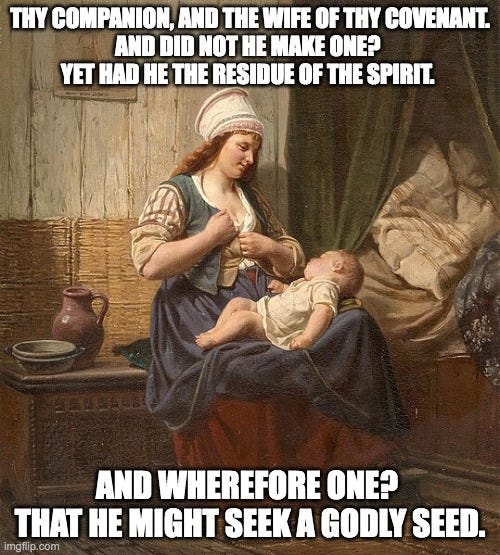

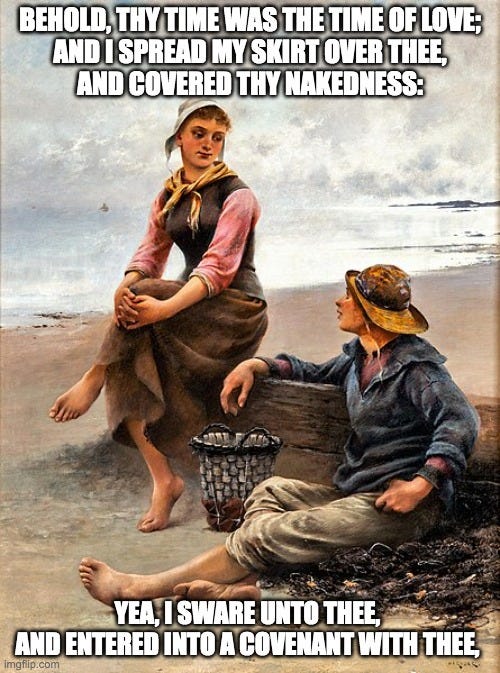
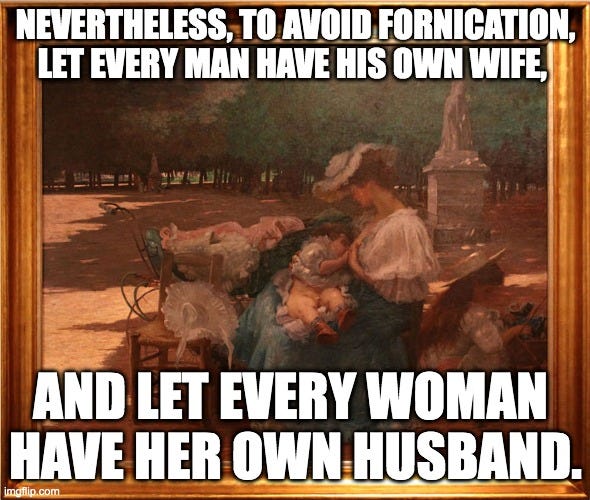
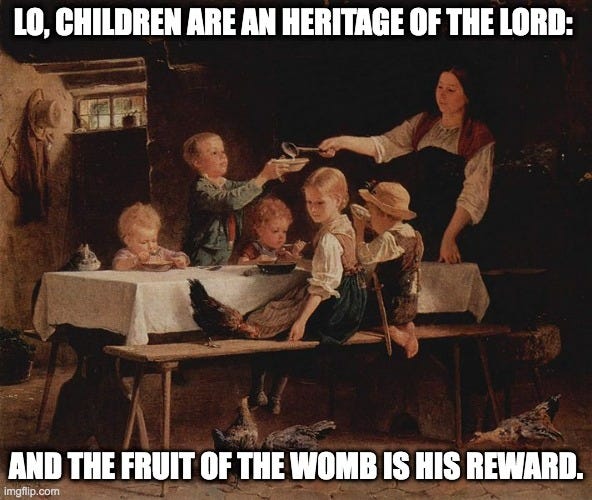
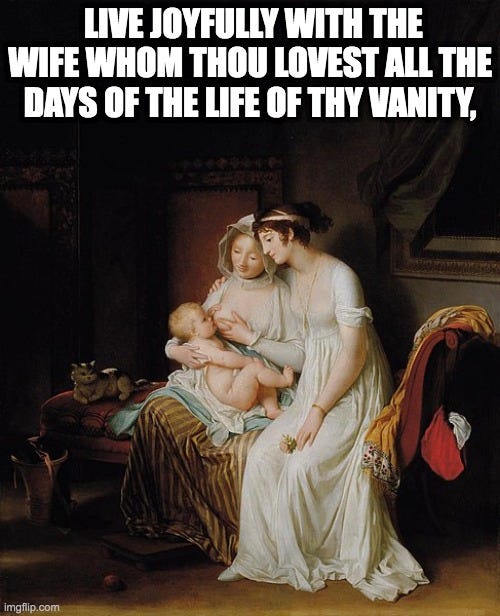
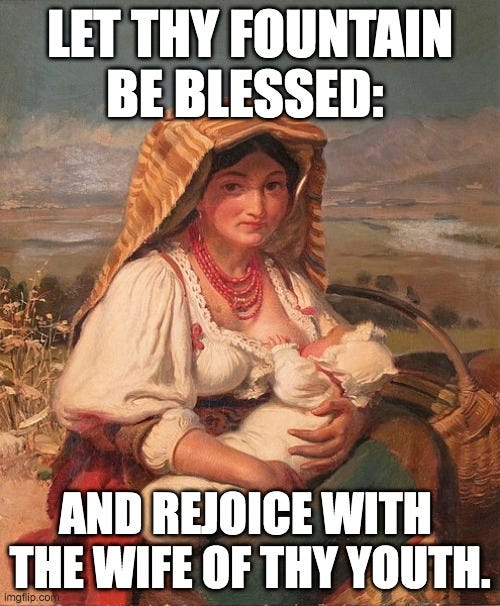
Von,
Thank you for a serious reply to this thought provoking discussion. The comments have been fun to read, as well.
I'm not sure of the best way to address your reply, and it may be a bit jumbled, but here's an attempt.
*****
You stated in the comments section of the article responding to my previous query:
“As for covenants having at least two parties, both of whom agree to something, yes, that is normal but, as Webster pointed out, it is not universal. There must be two parties of some sort, but they don't both need to give, or even give the same.
My own opinion, not to go too far out on a limb, is that the covenant of marriage was established in Genesis 2, and the rest of us kind of join it as it comes our turn.”
*****
I *think* I can appreciate and possibly agree with your conclusion, but I think it needs more work to establish why it should be viewed in that way, and I’ll push on as a Berean (or devil’s advocate!) for clarity’ sake.
If marriage was established as a covenant in Genesis 2, and if it was established by God, not by Adam, why was it not made more explicit in covenantal language when the explanation is clearly being given that it is to be a “leave and cleave” one flesh relationship per Gen. 2:24? I find it unlikely that such a monumental deal would be left with ambiguity.
There are other statements in Scripture of how a thing ought to be - such as parents should teach their children diligently (Duet. 6:7) - and the mere statement or even a command of how a thing ought to be, does not seem to equate to a covenant. So, “therefore shall a man leave his father and mother and shall cleave to his wife” does not automatically qualify it as elevated to a covenantal relationship in my mind. It simply states what ought to be.
To this point, looking at the rest of the covenants enumerated in Scripture, they generally appear to be explicit covenants, not implicit, and they are expressly declared to be such. God does not keep his covenants a secret, from Noah, onward. Other covenants such as between Jacob and Laban, David and Jonathan, and between kings and their people are clearly stated as such. This makes an unspoken and undefined “marriage covenant” a glaring exception.
The marriage “covenant” is not explicitly stated in the vast majority of marriages in the Old Testament with the possible exception of the passages in Ezekiel and Malachi, neither of which are specific to named human individuals and both of those do not *require* the implication that all other marriages are explicitly covenants. The Ezekiel 16:8 passage certainly compares God’s relationship to Jerusalem to a marriage, but it is also clearly an analogy and descriptive and not necessarily prescriptive to the exact way that men and women should come together in every marriage. It does bend the picture towards a one-sided covenant, though and I *do* agree with your mention that the Noahic covenant appears to be essentially one-sided.
As another commenter mentioned, there is room for interpretation in the Malachi 2:14 passage that it is referencing marriages appropriate to the Mosaic covenant vs specific marriage covenants, but presuming otherwise, the implication is still that a covenant was made, that was not being honored,
Here are some more questions to help define things further:
Implications:
1. If marriage was NOT found to always be a covenant, how does this affect our view of marriage?
2. Can law, obligation, required obedience, as in a marriage, exist without a formal covenant?
3. Is marriage somehow less important if it is of a non-covenantal nature?
4. Is the marriage covenant generally one-sided, and implicit?
5. Is it “not a marriage” if the man does not understand it as covenant but is faithful to his wife regardless?
6. Can a covenant exist where no declaration of such has been made?
Specific cases:
1. If marriage is always a covenant, how do we view scenarios like Jacob and Leah? In that case, it would seem that none if the conditions of the Websters dictionary definition of covenant is necessarily met. Is a covenant possibly required by an sexual act even where intent was not present?
2. Is marriage in general a de facto covenant even where no personally directed intent existed?
3. Since a covenant or treaty between Jacob and Laban is mentioned in Genesis 31, why is no covenant discussed regarding Jacob's marriages to his two daughters?
4. In the cases of Dueteronomy 21:11-14 is marriage a one-way covenant?
5. In the case of the Benjamites in Judges 21, are such marriages also one-way covenants?
Blood and covenants.
Hebrews 9 is pretty clear that the shedding of blood - by death - is a condition of a covenant. While there are a few passages that do not directly mention the shedding of blood for a man’s covenant - say, the covenant between David and Jonathan - it does appear that it was understood by the Hebrew people that it was a required component, and it seems that it’s practice continued even into the time of the prophets - see Jer. 34:18-19.
You mention the blood in relation to the consummation of marriage to a virgin, but I am skeptical that this in ANY way qualifies. Also, say in the case of a second marriage, such as of the widow in 1 Cor. 7:39, (which is an interesting verse) there might not be any blood... also, it says she is bound by the law, vs by covenant.
I suppose that you could argue that the Noahic covenant’s shedding of blood was made with the blood sacrifice by Noah's party, so perhaps there is room for that in a marriage covenant, but it still seems a bit of a stretch.
In contrast, Jesus, who clearly made a covenant with the church, shed His blood for His bride. In this covenant the bride’s blood is not what is shed in the marriage picture of Christ and the church.
In summary, I am not at all opposed to a Christian marriage including a man’s covenant as a picture of Christ and the church, but I’m not convinced that *all* marriages are, or of necessity must be covenantal. I do believe that all marriages must meet God's definition, and all marriages fall under the jurisdiction of Biblical obligation(s) with regards to marriage.
Ryan
Can you show me where in Malachi 2, G-d refers to marriage *as* a covenant? I see the word "covenant" used in the same verse as "wife," but that is not the same thing.
In principal, I have little idea with the idea of marriage as covenant, given that it is most explicitly a relationship entered into by two parties, in which they assume obligations to one another. I just don't see the Biblical support you claim.